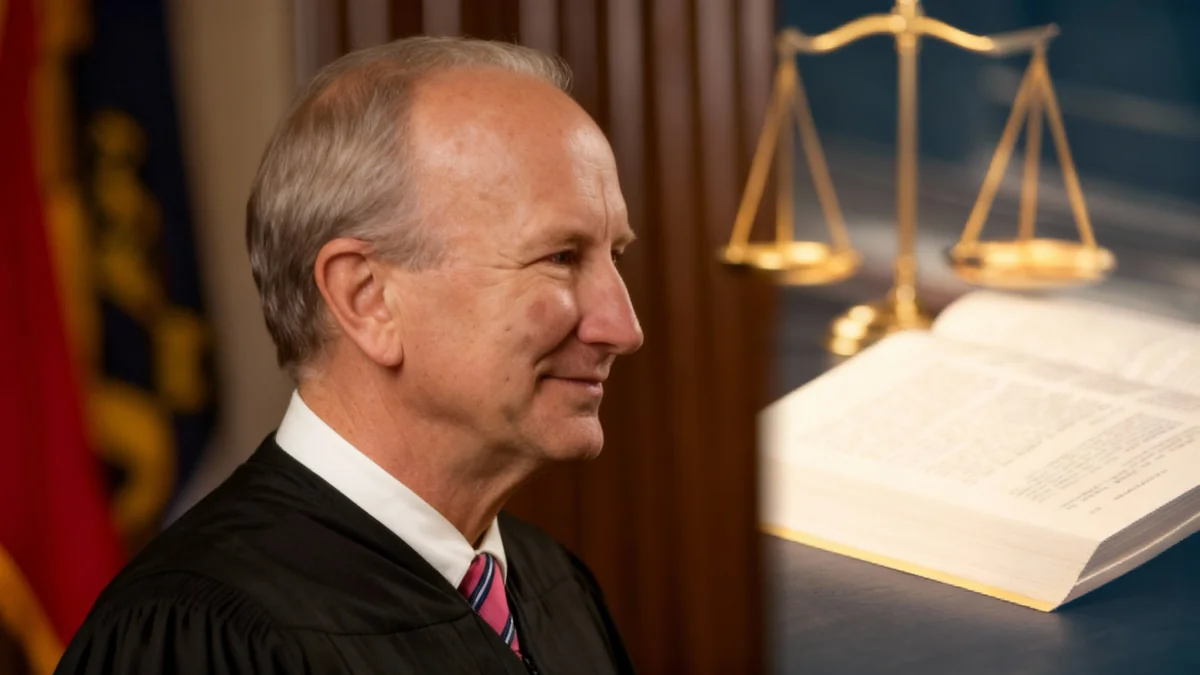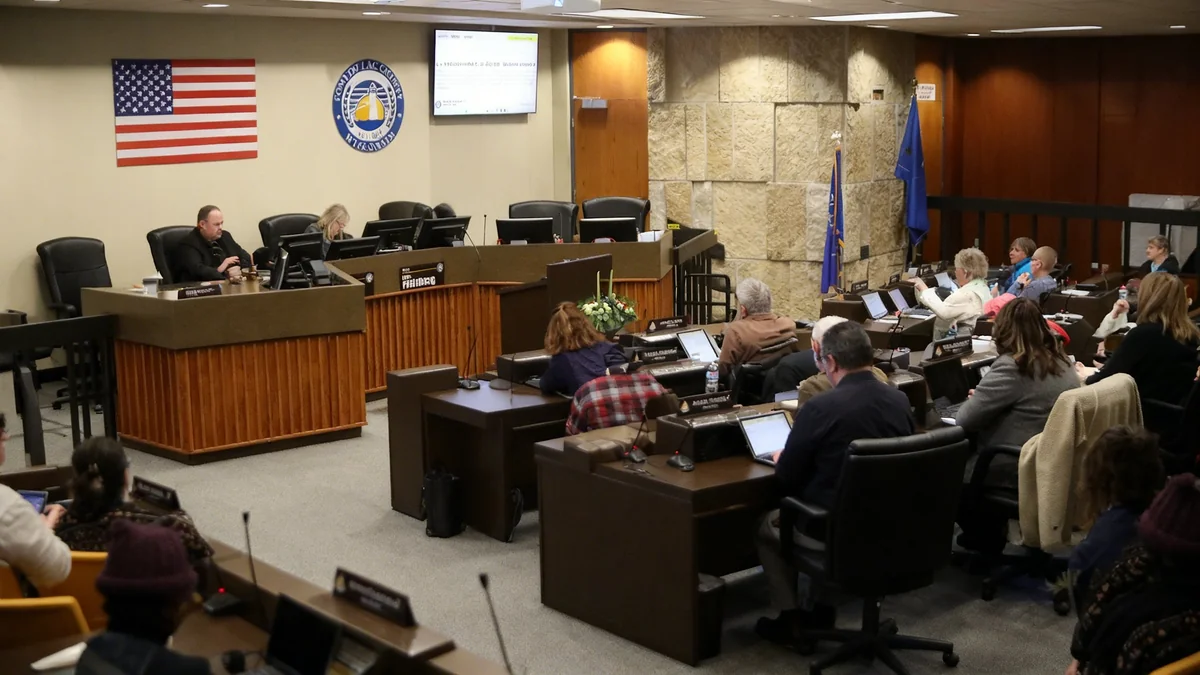In early 2023, the North Carolina Supreme Court made a decision that reverberated across the nation's political landscape. Under the leadership of Chief Justice Paul Newby, the court, with its new 5-2 Republican majority, reversed a recent ruling that had outlawed partisan gerrymandering in the state.
This move allowed the GOP-controlled legislature to redraw electoral maps, directly contributing to a six-seat swing in the U.S. House of Representatives during the 2024 elections. The decision highlights a broader transformation of the state's judiciary, which has moved from a traditionally nonpartisan institution to a key player in political battles.
Key Takeaways
- North Carolina's Supreme Court reversed its own anti-gerrymandering decision in 2023 after Republicans gained a majority.
- The new electoral maps led to a 10-4 Republican majority in the state's congressional delegation, influencing control of the U.S. House.
- Chief Justice Paul Newby has played a central role in making judicial elections partisan and increasing the influence of political money.
- As Chief Justice, Newby has used his executive authority to appoint conservative allies and remove judges who do not align with his views.
- The shift in North Carolina is seen by experts as a model for the politicization of state courts nationwide.
A Swift and Decisive Reversal
The path to redrawing North Carolina's political maps was cleared with remarkable speed. In 2022, a Democratic-led court had declared partisan gerrymandering unconstitutional and ordered new maps drawn by independent experts. These maps resulted in an evenly split 7-7 congressional delegation, reflecting the state's status as a political swing state.
Everything changed after the 2022 elections, when two Republican justices won seats, shifting the court's balance to a 5-2 conservative majority. In January 2023, Republican lawmakers immediately petitioned for a rehearing of the gerrymandering case—a highly unusual request. Historically, the court had granted only two such petitions since 1993, both for minor corrections.
According to sources familiar with the court's internal processes, Chief Justice Newby departed from the long-standing precedent of holding in-person debates for significant matters. Instead, the decision to rehear the case was handled via email. The court's conservative majority approved the order within an hour, giving the two liberal justices a little over 24 hours to write a dissent.
A Six-Seat Swing
The court's decision to allow new electoral maps transformed North Carolina's congressional representation from a 7-7 split to a 10-4 Republican advantage. This six-seat difference was a critical factor in determining which party controlled the U.S. House of Representatives after the 2024 elections.
Following a brief conference, Newby authored the majority opinion. He declared that the previous court had overstepped its authority and that creating electoral maps was a power reserved for the legislature. This paved the way for the new maps and a significant political shift.
The Architect of a Partisan Court
Paul Newby's influence on North Carolina's judiciary extends back nearly two decades. Elected as an associate justice in 2004 with no prior judicial experience, Newby has been a driving force in eroding the barriers that once separated the courts from politics.
He advocated for significant changes to how judges are selected in the state. Key among these were:
- Partisan Elections: Newby supported the legislature's move to make judicial races explicitly partisan, requiring candidates to run with a party label next to their name.
- Elimination of Public Financing: He also backed the decision to end public financing for judicial campaigns. This change made candidates more reliant on private donors and outside spending groups, often referred to as dark money.
These changes transformed judicial campaigns into expensive, highly contentious political battles. In his own 2012 reelection campaign, Newby's race saw an influx of about $2 million from undisclosed donors in the final weeks, helping him secure victory.
"Without question, Chief Justice Newby has emerged over the past 20 years as one of the most influential judicial officials in modern North Carolina history," said Bob Orr, a former Republican justice who Newby replaced on the court.
As chief justice, Newby has also wielded extensive executive power over the state's 7,600-person court system. He has replaced numerous employees, including many who were openly liberal or LGBTQ+, with conservatives and individuals from his personal network, such as former clerks and attendees of his prayer groups. He also demoted senior judges, including Democrats and moderate Republicans, replacing them with close allies.
Faith, Family, and Jurisprudence
Newby has been open about the role his devout Christian faith plays in his life and work. He has described his mission on the court as delivering “biblical justice” and has said he believes God called him to serve.
This conviction has guided him since his first campaign in 2004. As a federal prosecutor with no public profile, he built a coalition of church and homeschool communities to win a seat on the state's highest court. He has cultivated a network of conservative mentees and allies through Bible studies and prayer breakfasts.
A National Trend
The events in North Carolina are part of a larger national movement. For years, conservative legal organizations have invested heavily in state supreme court races across the country. State courts handle approximately 95% of all legal cases in the U.S. and have become the final arbiters on critical issues like voting rights, abortion access, and civil liberties.
His family has also been deeply involved in his political ascent. His wife, Macon, is a significant donor to Republican campaigns and was an investor in a right-wing media outlet that provided favorable coverage of her husband. His daughter, Sarah, has managed judicial campaigns and ran a fundraising committee dedicated to electing conservative judges.
In his 2020 race for chief justice against incumbent Cheri Beasley, Newby won by just 401 votes out of nearly 5.4 million cast. The campaign was hard-fought, with Newby attacking Beasley's efforts to study racial bias in the court system.
Questions of Ethics and Accountability
Throughout his tenure, Newby's actions have raised ethical questions. In 2023, he and three Republican colleagues attended a weeklong legal conference in Hawaii, with expenses of around $14,000 covered by George Mason University's Antonin Scalia Law School, a hub for the conservative legal movement. Only one of the four justices disclosed the trip on their ethics forms, which require reporting gifts over $500.
Campaign finance records also show Newby has made several financial contributions to political candidates since 2008, despite judicial conduct rules that prohibit judges from doing so. Experts have described these as clear violations of the state's judicial code.
Furthermore, Newby has presided over cases involving potential conflicts of interest. He wrote an opinion in a case involving an anti-abortion adoption agency he founded without disclosing his past connection. He also ruled in multiple cases involving Duke Energy while he and his wife held stock in the company.
Changes to the state's judicial oversight body, the Judicial Standards Commission, have also concentrated power within the Supreme Court. Newby supported legislation that cloaked the commission's investigations in secrecy and gave the high court veto power over sanctions. This has made it more difficult to hold justices publicly accountable for their actions.
A Lasting Legacy
The changes spearheaded by Chief Justice Newby have created a new reality for North Carolina's judiciary. Elections are now fiercely partisan and expensive, and the court itself operates more like a political body than an impartial arbiter of law. The practice of deliberating in person on major cases has reportedly been abandoned, with the conservative majority often circulating draft opinions to the minority without collaborative discussion.
While the legislature recently raised the mandatory retirement age for judges, allowing Newby to complete his term, he is not expected to run again. However, his legacy of a politicized court system is set to endure. The current Republican majority on the Supreme Court is secure until at least 2028, regardless of future election outcomes.
North Carolina now serves as a blueprint for other states where conservative movements seek to gain control over the judiciary. The blurring lines between judicial and political branches have led to a decline in public trust. A recent Gallup poll showed that only 35% of Americans trust the courts, a record low.
As one legal expert noted, if the clear distinction between the judiciary and politics is not preserved, the system risks becoming one of “naked power all the way down.”




